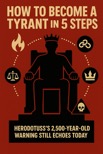How to Become a Tyrant in Five Easy Steps — Lessons From Herodotus
Saturday, September 20, 2025 - Filed in: General Interest

Here is the tyrant’s playbook in five steps.
Step 1: Cultivate a Passion for Power
Herodotus recounts the tale of Deioces, founder of the Median empire, whose obsession with absolute rule was as strong as passion itself. He coupled desire with strategy, using intellect to justify ambition. From the start, the tyrant’s defining feature is that hunger for unchecked authority.
Step 2: Foster Dependence
Deioces began by serving as a judge during a time of lawlessness. His fairness made him indispensable. Then he stepped away — plunging society back into chaos until the people begged him to rule. The lesson? A would-be autocrat thrives by making order seem possible only through them.
Step 3: Build a Cult of Personality
Once king, Deioces elevated himself above his subjects. He built fortress walls to keep distance, demanded intermediaries for communication, and outlawed direct eye contact. As Professor Clifford Orwin puts it, he created a “pre-modern prototype of a totalitarian state.” Today’s strongmen employ the same tactics — projecting mystique, controlling access, and ensuring no one forgets who is special.
Step 4: Rule Through Fear
Herodotus’s portrait of Xerxes, the Persian king, illustrates this chilling truth: fear is the tyrant’s glue. Whether through spectacular punishments or modern-day “accidents” befalling critics, despots remind their people that disobedience costs dearly. Fear ensures obedience where loyalty never could.
Step 5: Seize the Courts
Finally, tyrants make themselves the law. Herodotus describes Cambyses, who wanted to marry his sister despite the prohibition. The judges, eager to survive, decreed that since the king could do whatever he wished, legality was whatever he said it was. When law bends to the ruler, there is no longer any law.
The Enduring Warning
Herodotus reminds us that tyranny is not an accident but a deliberate process. What’s most sobering is how little the pattern has changed over the millennia. The desire for stability, the temptation to empower a “strong leader,” and the dynamic of autocracy itself make tyranny both seductive and dangerous.
As Morgan observes, “Human nature always stays the same.” What changes are the circumstances in which we either resist or enable authoritarianism. The ancient blueprint remains a living warning: once power is given to a tyrant, it cannot be controlled.


